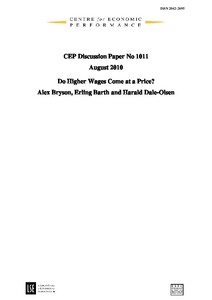Do higher wages come at a price?
"Using linked employer-employee data for Britain we find job satisfaction and job anxiety are negatively correlated but higher wages are associated with higher job satisfaction and higher job anxiety. However, we observe a positive association between higher wages and non-pecuniary job satisfac...
| Main Authors: | , , |
|---|---|
| Institution: | ETUI-European Trade Union Institute |
| Format: | TEXT |
| Language: | English |
| Published: |
London
2010
LSE |
| Subjects: | |
| Online Access: | https://www.labourline.org/KENTIKA-19183294124919014769-Do-higher-wages-come-at-a-pric.htm |
| Summary: | "Using linked employer-employee data for Britain we find job satisfaction and job anxiety are negatively correlated but higher wages are associated with higher job satisfaction and higher job anxiety. However, we observe a positive association between higher wages and non-pecuniary job satisfaction, which disappears with the inclusion of our effort measures. Thus high effort levels provide high levels of non-pecuniary job satisfaction and higher wages, in contrast to what compensating wage differentials predicts. On the other hand, the positive association between wages and pay satisfaction and the positive association between wages and job anxiety are both robust to the inclusion of our effort measures and rich job controls. Mean wages of co-workers are positively associated with pay satisfaction but there is no significant association with non-pecuniary job satisfaction or job anxiety. Thus there is a positive spill-over to workers from being in a high-wage workplace and there is no support for the proposition that within-workplace wage differentials are a source of job anxiety. " |
|---|---|
| Physical Description: | 19 p. Digital |

